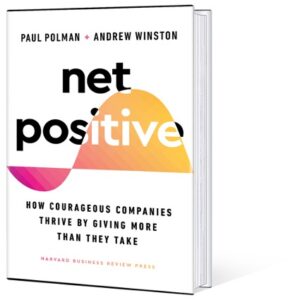Tractor Supply Company, a Fortune 500 business, recently issued what may be the first anti-sustainability statement. The company is stepping away from ESG-type efforts to focus more on “rural American priorities” (Are those truly at odds with sustainability? Discuss…).
It’s become fashionable to say that companies shouldn’t try to do everything, and instead focus their sustainability efforts on where they can have real impact. A worthy discussion. But is Tractor Supply’s more aggressive move away from sustainability a good idea?
Here are the 5 anti-commitments and my thoughts:
“Going forward we will ensure our activities…tie directly to our business… we will:
“1. No longer submit data to the Human Rights Campaign”
Even if human rights are not a core issue for them, why call it out? Is there a large constituency that’s against just capturing data about human rights?
“2. Refocus our Team Member Engagement Groups on mentoring, networking and supporting the business”
Ok, sounds good, but what were they focused on that was wrong?
“3. Further focus on rural America priorities including ag education, animal welfare, veteran causes and being a good neighbor, and stop sponsoring nonbusiness activities like pride festivals and voting campaigns”
It’s good business to focus on customer priorities like ag education and animal welfare. Also, a tractor company may not need to sponsor pride festival but, to state the obvious, in rural communities, there are gay people and farmers. Also, how can “veteran causes” be good while “voting campaigns” are bad, non-business activities. Most U.S. veterans fought against fascism, communism, and dictators and thus for democracy and voting.
“4. Eliminate DEI roles and retire our current DEI goals while still ensuring a respectful environment”
This could be a mistake. DEI is about inclusiveness for a broad array of people – not just people of color and the LGBTQ+ community, which get all the attention, but also women, the disabled, older Americans, and economically disadvantaged people. In a recent national survey, 69% of Americans said they supported “programs to hire more employees from groups that are underrepresented in their workforce, such as racial and ethnic minorities and people with disabilities and to promote equity in the workplace.” Half (49%) of Republicans supported this as well. Also, diverse teams have repeatedly been shown to be more innovative and they outperform financially.
“5. Withdraw our carbon emission goals and focus on our land and water conservation efforts”
I get it. Climate action is (stupidly) a political football in the U.S. But, quick, name a group that is affected the most by climate change?
Maybe farmers?
Farmers are in the thick of climate and working on it. The American Farm Bureau Federation’s site has a lot of content on climate-smart agriculture and declares its focus to be “Building a sustainable future.” So Tractor Supply Company’s customers may have their own climate goals, or at the very least, they’re suppliers to food and ag giants that have aggressive carbon reduction goals for their entire value chain. Farmers increasingly need climate plans and data.
And on a tactical level for Tractor Supply Company, reducing emissions is good business. It includes:
- Cutting energy waste (saves $)
- Buying renewables (saves $)
- Designing products to use less fuel (saves customers $)
As a senior exec at a large consulting firm said to me, “So, they’re rejecting known best practices that serve them and their customers well?”
It seems to be that withdrawing carbon targets is either just for show (and they’ll keep cutting carbon), or it’s a strange intention to spend more money and be less innovative. It’s taking what’s a gift of value creation and throwing it away.
And land and water conservation? Yes, they’re big priorities, but climate change has serious impacts on them. A company serving farmers should be leading climate action to protect their farms and water resources.
Let’s take a hard-nosed view. This statement might please SOME customers and avoid some hard conversations for now. But in the long run, it’s doubtful that it’s good for the business.
[See discussion this article on LinkedIn]
[Image istock by komta]
- If you enjoyed this post, please pass it on. Subscribe to get all of Andrew’s articles in your in-box.
- Follow Andrew on LinkedIn (I’ve exited Facebook and paused Twitter for now)
- Join the Net Positive movement or to expand your learning, check out our new Net Positive online classes and other executive education offerings.



